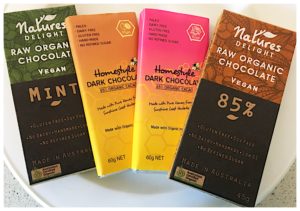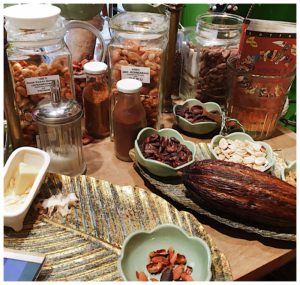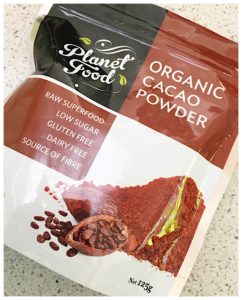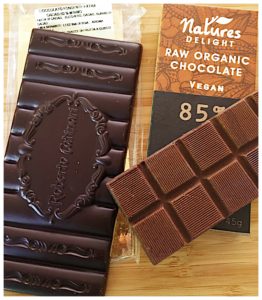13 November 2016
I have a confession to make. I’m a cacao novice. Until recently, I too have been guilty of using the word “cacao” interchangeably with the word “cocoa”?
 I can’t help but notice that, of late, establishments from health food shops, supermarkets and boutique grocers right through to fruit markets have jumped on the cacao bandwagon peddling powders, bars, snacks, drinks and even toiletries. Some artisanal chocolate makers have even started selling “raw” cacao and chocolate bars.
I can’t help but notice that, of late, establishments from health food shops, supermarkets and boutique grocers right through to fruit markets have jumped on the cacao bandwagon peddling powders, bars, snacks, drinks and even toiletries. Some artisanal chocolate makers have even started selling “raw” cacao and chocolate bars.
What’s the big deal with cacao and how is it different from good ‘ol cocoa?
Cacao vs. Cocoa
Like many, I used to think that they were one and the same.
True, they are both derived from the same plant – the Theobroma cacao, and start off as cacao beans. The beans are extracted from the cacao pods or cabosses, fermented then dried. However, the point of distinction begins after this.
 In general, to produce cacao, dried unroasted cacao beans are cold pressed to produce cacao solids and cacao butter. Cacao powder is made from cold milling the cacao solids while the cacao bar is the product of mixing a proportion of the solids with the butter.
In general, to produce cacao, dried unroasted cacao beans are cold pressed to produce cacao solids and cacao butter. Cacao powder is made from cold milling the cacao solids while the cacao bar is the product of mixing a proportion of the solids with the butter.
Cocoa, on the other hand, is produced by first roasting the cacao beans. Upon roasting, the beans become cocoa beans. The cocoa beans are then subjected to several key processing steps namely winnowing, grinding/ milling, refining and conching, as explained in my previous post “Let’s Talk About: Bean to Bar“. The resultant working chocolate is tempered to create the desired characteristics of the final chocolate.
Some manufacturers may roast cacao beans at lower temperatures under 50ºC, in accordance with the definition of “raw” foods, and subject the beans to the same processing steps as cocoa. They refer to their finished product as cacao or raw cacao, which has led to some controversy in the chocolate world.
The Case for Cacao vs. Cocoa
 Consensus amongst the majority of health food fanatics is that cacao is better for you. It is claimed that roasting, typically to high temperatures, and processing destroys the nutritional, health-promoting properties of the beans (which were previously discussed in my post “Let’s Talk About: Chocolates for Health“).
Consensus amongst the majority of health food fanatics is that cacao is better for you. It is claimed that roasting, typically to high temperatures, and processing destroys the nutritional, health-promoting properties of the beans (which were previously discussed in my post “Let’s Talk About: Chocolates for Health“).
However, many chocolate makers believe that cacao is no healthier than cocoa. This is because the raw cacao beans are subjected to heat-inducing fermentation and drying prior to roasting, sometimes uncontrolled and in excess of 50ºC, which renders the beans “cooked”. In addition, unroasted cacao beans may have been poorly handled from a hygiene/ food safety perspective, thereby exposing consumers to the risk of food borne illnesses from common pathogens such as Salmonella, E. Coli, Staphylococcus and Listeria.
My Verdict
As a scientist, self-confessed chocoholic and occasional foodie who appreciates the benefits of healthy eating and exercise (yes, I know I’m conflicted on so many fronts?), I can clearly see both sides of the argument. However, for me, the key determining factor is the overall chocolate experience.
 I decide to run my own “trial” comparing the taste and texture of chocolate made from cacao versus cocoa. I’ve pitched Roberto Catinari’s 80% bar against Natures Delight’s Raw Organic Chocolate 85%.
I decide to run my own “trial” comparing the taste and texture of chocolate made from cacao versus cocoa. I’ve pitched Roberto Catinari’s 80% bar against Natures Delight’s Raw Organic Chocolate 85%.
Roberto Catinari’s 80% bar (sweetened with sugar): The nose is nutty, slightly earthy. The mouthfeel is smooth and pleasant, and the chocolate tastes nutty with hints of caramel. The finish is mild and fleeting.
Nature Delight’s Raw Organic Chocolate 85% (sweetened with coconut nectar): The nose is woody and I detect a smell closely resembling volatile chemicals. The texture is slightly gritty and as it melts, leaves a strongly astringent mouthfeel and bitter, woody taste. This bitter taste remains long after the chocolate has melted.
On the basis of this un-scientifically validated “trial”, I think I’ll stick to cocoa-derived chocolate for now, thank you very much, and resort to other avenues to get my health kick!